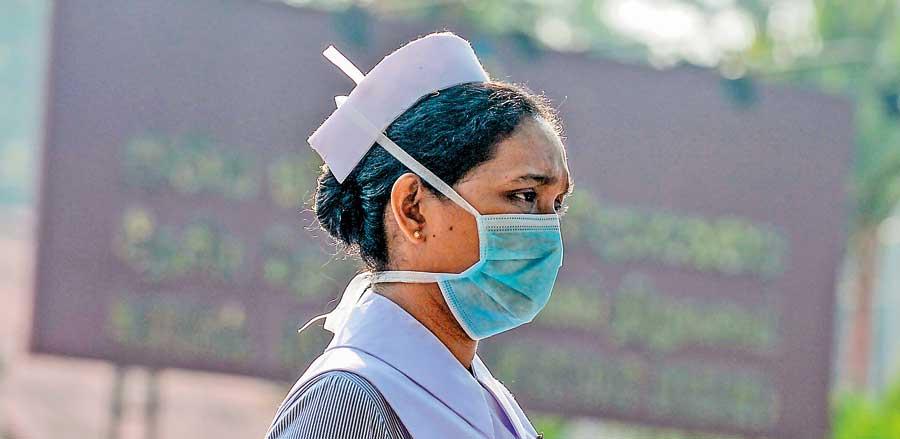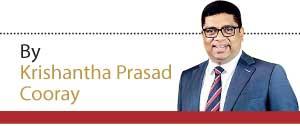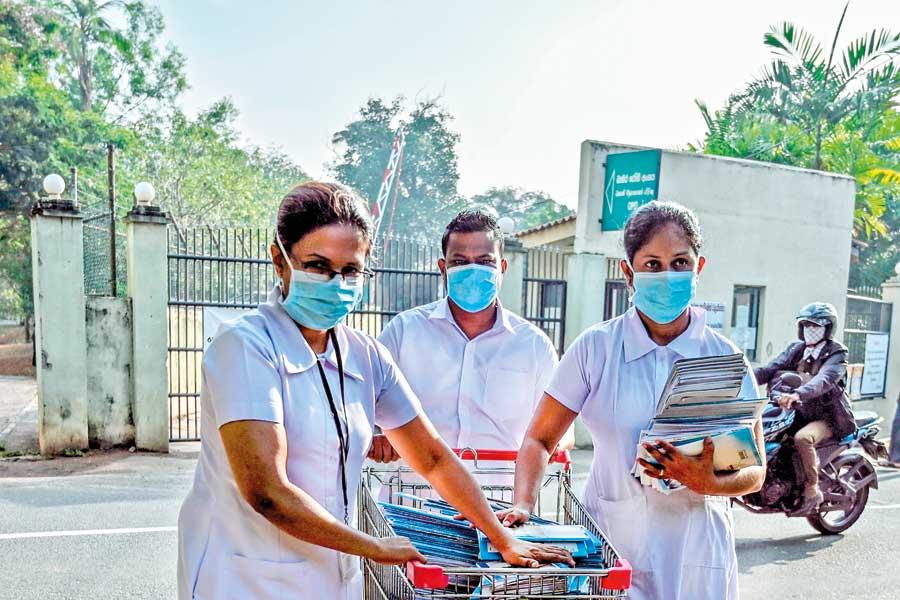Reply To:
Name - Reply Comment
Which profession would it be in 2021?

Sadly, the public health narrative was hijacked from all quarters, and a strong, clear message on social distancing and hygiene quickly gave way to superstition, politics, religious extremism and militarization
Our nurses implemented ruthlessly efficient hygiene protocols at every health facility in the country and worked tirelessly to continue administering wards even amid shortages of personal protective equipment
One year ago, so-called astrologers took to two television stations to tell the nation what to expect in 2020. A  person going by the name Chandrasiri Bandara explained that the stars were so moved by political developments in Sri Lanka that 2020 would be an extraordinarily prosperous year. At the same time, someone called Manjula Peiris was on TV explaining that the election results caused a planetary alignment that would open the floodgates of foreign investment in 2020. Indeed, Bandara was so specific saying that the bulk of the prosperity would come after March 2020. To put it mildly, either they or their planets seem to have got their wires crossed.
person going by the name Chandrasiri Bandara explained that the stars were so moved by political developments in Sri Lanka that 2020 would be an extraordinarily prosperous year. At the same time, someone called Manjula Peiris was on TV explaining that the election results caused a planetary alignment that would open the floodgates of foreign investment in 2020. Indeed, Bandara was so specific saying that the bulk of the prosperity would come after March 2020. To put it mildly, either they or their planets seem to have got their wires crossed.
There is no shame in forecasting the fate of the nation based on a political perspective or ideology. Indeed, many Sri Lankan professionals and businesspeople also predicted that 2020 would be good for the country. The difference is that their conviction flowed from faith in a leader untarnished by politics who they saw as a breath of fresh air, and anticipation of a political culture that would shake up the public service.
Their miscalculation and disappointment could have been lessened if not for the pandemic, but this article is not intended to chronicle the many failures of the Government. The fact is that no one could have predicted the economic devastation and paralysis that COVID-19 would cause not just in Sri Lanka, but also globally. Success has been the exception, not the rule. Outside of Taiwan, Australia, New Zealand, South Korea, Singapore and Japan, it is hard to find a country that has not been ground to a halt by the Coronavirus.
With over 40,000 people testing positive in Sri Lanka and nearly 200 fatalities, there is no gainsaying we could have done better. However, the same could be said of nearly every other country. What we do know is that if not for the knowledge, courage and professionalism of our frontline workers and first responders, we could easily have had over 10 times as much suffering.
Sri Lanka is blessed with one of the finest healthcare systems. Despite spending under 4% of our GDP on health, we boast of some of the best health outcomes to be had, including low infant mortality, high vaccination rates and free access to healthcare as a right to all citizens. As a country we think of success and failure in terms of political parties and politicians. Partisanship aside, every government and every party has done its part to strengthen national health service, but the healthcare system is not the making of politicians.
It is a system comprising thousands of doctors, nurses, public health inspectors (PHIs), epidemiologists and other administrators who, even before COVID-19, shunned opportunities for employment in countries overseas which are short of doctors, nurses and healthcare professionals. They chose instead to remain in Sri Lanka and make its people well, for a fraction of the compensation they could earn abroad.
Long before COVID-19 struck, they were our front line of defence. The Health Service’s epidemiology unit is no stranger to fighting and eradicating deadly diseases. It worked with the World Health Organization (WHO) and United Nations (UN) to eradicate polio from Sri Lanka by 1993, and to rid the country of Malaria by 2016. Just as our national intelligence services stand vigilant against the resurgence of the LTTE, the professionals of the epidemiology unit have guarded the country against the resurgence of diseases that are in our past.
When the global pandemic struck, our health professionals knew what to do. They wanted to lock down the island to contain the virus and use that precious time to trace those exposed and educate the public on the essential rules for curtailing the virus: frequently wash hands, avoid touching face, wear face coverings and maintain one and a half metres apart from others.
Sadly, the public health narrative was hijacked from all quarters, and a strong, clear message on social distancing and hygiene quickly gave way to superstition, politics, religious extremism and militarization. The result was that the frontline workers and healthcare professionals who knew how to protect the people were sidelined, and yet they silently did their jobs exposed to great risk.
PHIs worked in communities without returning home for weeks, even sleeping in their offices without overtime pay, to trace and isolate potential COVID-19 patients. Our nurses implemented ruthlessly efficient hygiene protocols at every health facility in the country and worked tirelessly to continue administering wards even amid shortages of personal protective equipment.
Our physicians and other doctors monitored patients and those under quarantine and provided a quality of care that contributed to one of the world’s lowest COVID-19 mortality rates, at just 0.4%. Of every 1,000 people infected with COVID-19 in Sri Lanka, only 4 have succumbed to the virus. In Sri Lanka, whether you are a peasant, prisoner or professional, our doctors have honoured their Hippocratic oath to ensure that you receive the best medical outcome.
Even once the virus spread through the country, and it was not considered safe for anyone to walk the streets, our police and military personnel put their lives on the line to protect the rest of us. To date, over 1,500 police officers and nearly 1,000 navy personnel have been infected with COVID-19 in the line of duty. Many of these infections could have been avoided if senior policy and military officers had bowed to health professionals, instead of making doctors and professionals bow to them.
Overseas it was the doctors who made decisions, and the military and police who implemented those decisions. Only in Sri Lanka did we try the reverse. There is no matching the efficiency and logistical prowess of our military and police department. Against an unknown enemy like a virus, it is for their own sake that they should have been allowed to benefit from deferring to the professionals who have studied the art of medicine for even longer than most soldiers have studied the art of war.
The role of doctors in fighting the war against the LTTE was restricted to field hospitals and operating theatres. Just as surgeons had no role to play in strategising the fall of Kilinochchi or the retaking of the Jaffna peninsula, it is futile to expect generals to learn epidemiology overnight to manage a public health crisis like the world has never seen.
Had we listened to public health experts
Whether they are doctors, nurses, police officers or soldiers, it is to all these frontline workers that we should dedicate the year 2020. It was their year. If not for them, Sri Lanka would be suffering beyond comprehension in the new year. Had we listened to the public health experts and given them a role in leading these brave men and women, perhaps we would have ranked among the countries that successfully defeated COVID-19 and prevent its resurgence. Alas, a willingness to defer to professionals over politicians and charlatans is all that separated Sri Lanka from those countries that managed to beat back the pandemic.
COVID-19 does not care what goes into a pot or who throws it into a river, nor will the virus be deterred in the slightest by any ingredient of this ridiculous ‘paniya’ that is being peddled in the halls of Parliament and receiving a shocking amount of tacit endorsement from officials and public figures who should know better. It was horrifying to watch political leaders, members of the clergy and media institutions promote a completely untested concoction and encourage people to gather in crowds at great risks to themselves and the public unchallenged, all while the police continue to arrest those who break quarantine and social distancing rules for the far more noble purpose of providing for their families.
The fact that none, but a few brave doctors has stood up to condemn this charade painted a very bleak picture of not just our country, but its one-of-a-kind healthcare system. Our country built this exemplary healthcare system on a foundation of science, rationalism and professionalism. It should be the pride of our people. It is the duty of all patriotic professionals to condemn and shun any swindler or witchdoctor who undermines our health services by peddling such dangerous miracle cures or concoctions. Doctors have a particular duty to speak out against such superstition when it will put the lives of their own colleagues and patients in peril.
With the new year comes new opportunities to put our past failures and mistakes behind us and chart a new course. 2021 can be a different, prosperous year, if we resolve as a country to insist that our leaders put professionals first and promote rationalism over junk science. Now that several options for COVID-19 vaccines will be available in 2021, our public health service will have an opportunity this year to flex its muscles and deploy one of the most efficient mass immunization programs in the world.
Anyone who is even contemplating taking this responsibility away from the national health service and entrusting it to some new ‘task force’ or other body should know that Sri Lanka’s national immunization program, run by the health service, has long been one of the most efficient of any country. Even if Sri Lanka is late to get stocks of the vaccine, we have an opportunity to put ‘paniyas’ behind us by efficiently immunizing every single Sri Lankan against COVID-19.
As a nation that cares for its people, wherever they may live, Sri Lanka even has an opportunity to do right by those of our countrymen stranded abroad with no way to return, by efficiently deploying vaccine stocks and coordinating the immunization of Sri Lankans worldwide through our network of embassies and consulates. It is by doing such things that the Government can redeem the confidence of its people and assert a role on the world stage as a country that nurtures its citizens and takes its responsibilities seriously.
2020 was marred by deception, partisan politics and economic uncertainty on top of COVID-19, making it one of the darkest years in living memory. While the poorest of poor took the brunt of the suffering, there was no shortage of fly-by-night businessmen who lost no time in taking advantage of your suffering, to pull off quick deals and make a fast buck, whether by manipulation of tariffs, tourism or other short-sighted tomfoolery with no regard for the credibility of our country.
Hopefully, in 2021, we can look forward to a culture of business leaders who earn and grow their fortunes by investing in the country, building a product or providing a service by employing Sri Lankans, rather than running behind wheeler dealers who use political connections to manipulate markets and regulations and score a quick buck at the cost of the public coffers.
For Sri Lanka to recover and transform its economy in a post-Covid world, we need to see fewer dirty deals and conmen healers and hear fewer ‘gotcha’ soundbites from politicians. In December 2019, many professionals and business leaders expected politicians to magically turn the country around in 2020. In 2021, it is their time to step up and make it happen. If they lead, politicians and officials will follow.
Last year, our doctors, nurses and PHIs stepped up to the plate and earned their role in history by putting their professionalism and duty above all other considerations and refusing to bow to pressure from any quarter. In 2021, let us hope that all professionals and leaders, whether in business, politics, the public service, judiciary, media or prosecutors, follow the example set by our doctors and make 2021 the year for all Sri Lankan professionals.
When I am writing for January 1, 2022, I am hopeful that this year will bring so many acts of courage, professionalism, integrity, conscience and ingenuity that I will be hard pressed to single out any single class of professionals to dedicate the year 2021 to.

Sri Lanka is blessed with one of the finest healthcare systems